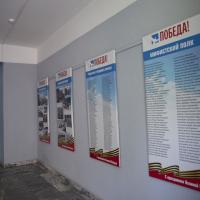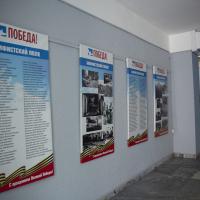From May 9 to June 22, MEPhI took part in the action “Scientific regiment” dedicated to the 76th anniversary of the Great Victory. The action is initiated by the Ministry of Science and Higher Education of the Russian Federation. Its main goal is to recall the achievements of Soviet science and scientists who have contributed to the struggle for freedom and peace.
During this time, MEPhI published materials about teachers, staff, and students who fought for their homeland or brought victory closer with labor and scientific feat. In particular, at university, there is a photo exhibition "Scientific Regiment" dedicated to military service and work behind the lines of students and teachers.
MEPhI was founded in November 1942, during the tensest period of the Great Patriotic War, when the Nazis stood on the banks of the Volga in the Stalingrad region. On the initiative of the Deputy Chairman of the State Defense Committee L.P. Beria and the People's Commissar of ammunition B.L. Vannikov, Council of People's Commissars of the USSR adopted a decree on the opening of a new Moscow Mechanical Institute of Ammunition (MMIB), which played an important role in the history of Russian higher education.
MEPhI was established as a higher educational institution of a special kind, born of military necessity to solve personnel, scientific and technical problems. The defense tasks lay on the main direction of scientific and technological progress, and this determined its further fate.
During wartime, the institute was located on three sites — educational and administrative departments were located separately from each other, which created a lot of inconveniences. At that time, the institute had only three faculties: Tubes and fuses; Shells and mins; Bombs, cartridges, and casings.
Already on January 1, 1943, classes started in a building on Myasnitskaya Street (then Kirov Street), in the famous Yushkov house. Among the first MEPhI students were the participants of the Great Patriotic War, who came to study directly from the front. Later many defenders of the homeland became candidates and doctors of science, professors, honored workers of science and technology.
Viktor Grigorievich Kirillov-Ugryumov (March 18, 1924 - November 6, 2007), the first rector of MEPhI. Doctor of Physical and Mathematical Sciences, Professor, Honored Scientist of the RSFSR.
At the end of the 9th school grade, he enrolled in the First Naval School. After graduation in May 1941, Viktor Grigorievich was sent to the Higher Naval Engineering School named after V.I. F.E. Dzerzhinsky in Leningrad. However, Viktor Grigorievich did not get a chance to become a marine engineer. The war began, and the cadets were seconded to the army.
Since October 1941, in rank the foreman of the first class, he saw duty as squad leader of the 84th Marine Brigade. That brigade took part in the defense of Moscow from German troops. In 1941, in the battles near the city of Klin, Viktor Grigorievich was seriously wounded. He spent more than three months in hospitals, after that he returned unfit for duty and was discharged on May 31, 1942. At that time, the future rector of MEPhI was only 18 years old.
Nikolai Gennadievich Basov (January 14, 1922 - July 1, 2001), an outstanding Russian physicist, one of the founders of quantum electronics, Nobel Prize laureate in Physics, Academician of the Russian Academy of Sciences, Professor of the MEPhI, Head of the Department of Quantum Electronics at MEPhI, Scientific Supervisor Higher School of Physicists MEPhI - FIAN.
In 1941, Nikolai Gennadievich graduated from high school in Voronezh, was called up for military service, and sent to the Kuibyshev Medical Academy. In 1943, he received the qualification of a medical assistant and went to the active army, served on the first Ukrainian Front as a student at the Military Medical Academy and as an officer of the chemical defense battalion. After the war, Nikolai Gennadievich entered MEPhI.
Mikhail Ivanovich Ryazanov (November 12, 1926 - August 27, 2014), Honored Scientist of the Russian Federation, Honorary Professor of MEPhI, Honorary Worker of Higher Professional Education. After graduating from high school, Mikhail Ryazanov was called up into the Soviet Army in January 1944. In December 1944 he graduated from the Moscow Military Engineering School, where he completed a six-month course. After graduation, he was rated as a junior lieutenant and appointed as commander of a sapper platoon of the 385th rifle regiment of the 62nd NKVD division.
Mikhail Ivanovich said: “I was eighteen, and in my platoon, all people were fifty-year-old fighters. And they seemed to me to be old people, in general, the situation was unusual”. The platoon was engaged in dangerous, strenuous work. Mikhail Ivanovich Ryazanov was awarded the medal "For Victory over Germany" and jubilee medals for the merit to the Homeland.







